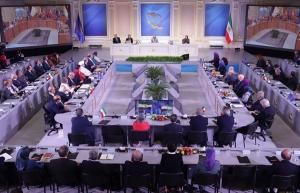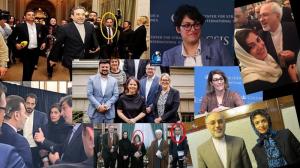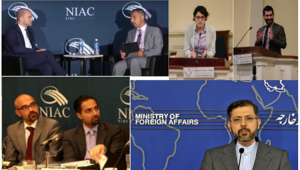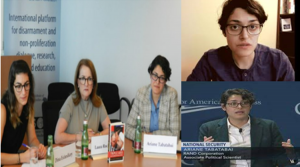
(Video) Tracing Iran’s Web of Influence in European Politics
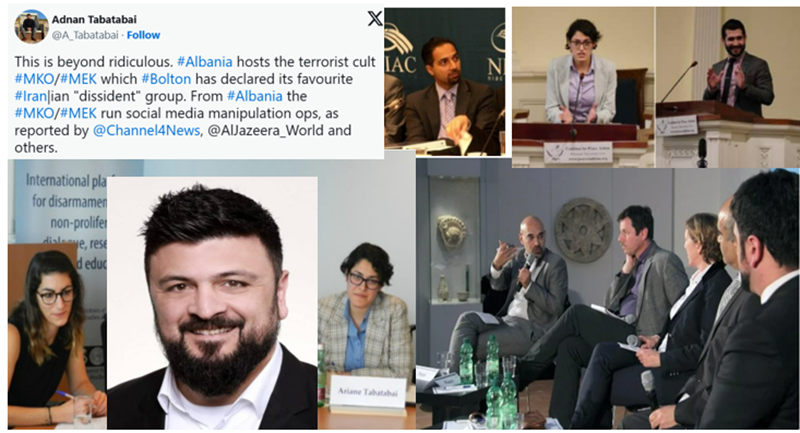
In a recent publication by Friends of a Free Iran (FoFI) at the European Parliament, a paper titled “Tracing Iran’s Web of Influence in European Politics: A campaign to Vilify Democratic Opposition” sheds light on the clandestine efforts of the Iranian regime.
On Sep. 26, 2023, “Iran International” published a report unveiling the regime’s influence operation in the US and European claiming to be Iran experts.
PARIS, FARANCE, November 28, 2023 /EINPresswire.com/ -- Intense Campaign to Vilify Democratic Opposition
The National Council of Resistance of Iran-(NCRI) Foreign Affairs Committee in an article stated that in a recent publication by Friends of a Free Iran (FoFI) at the European Parliament, a paper titled “Tracing Iran’s Web of Influence in European Politics: An Intense Campaign to Vilify Democratic Opposition” sheds light on the clandestine efforts of the Iranian regime.
This study specifically delves into the intricate maneuvers orchestrated by the regime through the “Iran Experts Initiative” (IEI), revealing a systematic campaign to establish connections with influential academics and researchers worldwide.
The paper unravels the extent of Iran’s web of influence within European politics, highlighting the alarming implications of these covert operations on the democratic opposition.
The full report of Friends of a Free Iran (FoFI) at the European Parliament:
Foreword:
In a world where the lines between truth and narrative are increasingly blurred, the decades-long policies toward Iran’s theocratic regime and its primary opposition, the People’s Mojahedin Organization of Iran (PMOI), also known as the Mujahedin-e Khalq (MEK), the principal member of the democratic coalition, the National Council of Resistance of Iran (NCRI), have been pivotal yet often misunderstood and misguided in the geopolitical arena. These policies have significantly influenced both U.S. and European approaches toward them.
In late September 2023, the revelation of email exchanges between a number of “Iran experts” and officials of the Iranian Regime’s Foreign Ministry was very shocking. It revealed a disturbing fact that European governments and institutions were relying on analyses and recommendations for their policy on Iran by the same experts who, according to this revelation, were part of a network set up by Iran.
These emails expose the Iranian regime’s covert initiative, under the pretext of the “Iran Experts Initiative” (IEI), which strategically infiltrated Western policy circles and media outlets to advance Tehran’s interests, including its nuclear program.
Initiated in the spring of 2014 by the Iranian Foreign Ministry, the IEI represents a sophisticated effort to reshape Tehran’s global image and further its strategic objectives.
At the helm of this operation were Iranian officials, including Saeed Khatibzadeh, advisor to former Foreign Minister Mohammad Javad Zarif, who meticulously worked to cultivate relationships with overseas academics and researchers.
This calculated engagement aimed to propagate Iran’s narratives within international policy forums and the media, a mission that would have profound implications for global diplomacy and security.
The leaked emails exchanged between Iranian diplomats and analysts span nearly two decades, from 2003 to 2021. These emails, once in the possession of Mostafa Zahrani, once a director-general of strategic affairs in Iran’s Foreign Ministry, uncover a network of individuals acting as conduits for Iran’s narratives.
Among them were academics and researchers who later ascended to prominent positions in the U.S. government and European think tanks and institutions, subtly yet significantly influencing policy decisions from within.
The West’s illusion about a non-existent moderate faction within the theocratic regime in Iran and the subsequent conciliatory approach toward Iran had laid the ground for the regime’s influence operation through these experts.
The review of their analysis and political recommendations to European institutions, as well as their articles in media and posts on social media, reveals a two-pronged strategy: advocating Tehran’s narratives on various issues, including the nuclear issue or Iran’s malign activities in the region, without direct support for the regime, and disseminating a false notion that there is no united and viable opposition.
This orchestrated campaign aims to demonize the democratic opposition of the NCRI and the main force for change, the MEK.
The objective is to suggest that in the absence of a viable alternative, the only option is improving relations with the regime and ignore its malign and destructive activities.
It is very disturbing that Iran’s ruling theocracy was allowed to conduct this influence operation in Europe, partly being financed by European taxpayers to advocate the Iran regime’s narrative.
Having said that, this operation also demonstrates the regime’s vulnerability from a political perspective and its fear of the democratic opposition, which it desperately tries to demonize.
The policy toward Iran’s regime has been, to say the least, one of ongoing engagement, often disguised as critical dialogue, constructive engagement, or containment. Meanwhile, the Iranian opposition, notably the PMOI/MEK and NCRI, has been largely disregarded as a credible alternative to this regime that not only oppresses its own people but also poses a major threat to regional and global stability.
This threat is not just due to its malign activities beyond its borders but also because of its relentless pursuit of nuclear weapons and the means to deliver them.
This foreword serves as a prelude to a paper that delves into the specifics of the IEI and explores the broader implications of such covert operations.
It calls for a deeper understanding of the mechanisms through which foreign governments can exert influence and emphasizes the need for robust measures to safeguard democratic processes and institutions from such interventions.
As readers embark on this journey through the shadows of international diplomacy, they are invited to reflect on the enduring impact of these revelations on our comprehension of global politics and the pursuit of truth in an increasingly interconnected world.
In conclusion, this report is a testament to the critical importance of transparency, vigilance, and accountability in the face of covert influence operations.
The revelations surrounding the Iran Experts Initiative shed light on the complexities of global politics and the potential manipulation of public perception.
As we delve into the detailed analysis within this report, let it serve as a call to action for policymakers, scholars, and the public alike to critically assess information sources and remain steadfast in the pursuit of truth and democratic values.
The shadows may obscure, but with scrutiny and awareness, the path to clarity and accountability can be illuminated.
Having said that, it is time for European governments and all institutions, including the EU, to reconsider their past policies on Iran and the democratic opinions of the National Council of Resistance of Iran (NCRI) and its principal member, the MEK, who have been the prime targets of a malicious disinformation campaign by the Iranian regime.
Javier ZARZALEJOS,
MEP, Spain
Introduction:
On September 26, 2023, “Iran International” and “Semafor” published a report unveiling the Iranian regime’s influence operation in the US and European institutions by individuals claiming to be Iran experts.
According to the report, in the spring of 2014, a discreet initiative emerged within the Iranian Foreign Ministry with the aim of reshaping Tehran’s global image and furthering its strategic interests, particularly regarding its contentious nuclear program. This clandestine effort, known as the “Iran Experts Initiative” (IEI), sought to establish connections with influential academics and researchers worldwide.
Iranian officials, including Saeed Khatibzadeh, an advisor to former Foreign Minister Mohammad Javad Zarif, embarked on a covert effort to establish connections with influential overseas academics. The goal was to ensure the propagation of Iran’s narratives across international policy circles and media outlets.
An investigation supported by leaked emails exchanged between Iranian diplomats and analysts unveiled the extent of the IEI’s concealed operation. These emails, spanning nearly two decades from 2003 to 2021, were initially owned by Mostafa Zahrani, a former director general of strategic affairs in Iran’s Foreign Ministry and an advisor to Javad Zarif.
They contained a treasure trove of documents, including passport copies, resumes, conference invitations, visa applications, and extensive correspondence with foreign ministry officials, university staff, and students. On March 3, 2014, Khatibzadeh sent an email to Zahrani asking for his “financial and political support” for the convening of the IEI formation.
The evidence found in these communications underscores a troubling reality: the Iranian regime successfully penetrated policy circles in Washington and Europe, wielding considerable influence.
Through the IEI, Iran orchestrated a strategic campaign to vigorously advocate for a favorable nuclear deal with the United States, and Europeans, ultimately resulting in the agreement reached in July 2015, known as the Joint Comprehensive Plan of Action (JCPOA).
At the core of this effort were a select group of individuals, described by Saeed Khatibzadeh, as “distinguished second-generation Iranians” with affiliations in prominent international think tanks and academic institutions. Notably, among the participants in this network were individuals who would later hold influential positions within the U.S. government, and European think tanks.
This includes Ariane Tabatabai, who currently serves in the Pentagon as the chief of staff for the Assistant Secretary of Defense for Special Operations, Dina Esfandiary, a senior advisor at the International Crisis Group, Ali Vaez Crisis Group’s Iran Project Director and Senior Adviser to the President.
Vaez in an email to Javad Zarif on October 2, 2014, expressed his commitment to help advance the regime’s narrative. He wrote, “As an Iranian, based on my national and patriotic duty, I have not hesitated to help you in any way; from proposing to Your Excellency a public campaign against the notion of [nuclear] breakout to assisting your team in preparing reports on practical needs of Iran.”
According to these emails, one of the “experts,” Arian Tabatabai would report her activities to Zahrani in the foreign ministry and sought guidance for follow-up.
She wrote to Zahrani in Farsi on June 27, 2014, to say she’d met Saudi Prince Turki al Faisal a former ambassador to the U.S. who expressed interest in working together and invited her to Saudi Arabia.
She also said she’d been invited to attend a workshop on Iran’s nuclear program at Ben-Gurion University in Israel. “I am not interested in going, but then I thought maybe it would be better that I go and talk, rather than an Israeli like Emily Landau who goes and disseminates disinformation. I would like to ask your opinion too and see if you think I should accept the invitation and go.”
Zahrani replied the same day: “All things considered, it seems Saudi Arabia is a good case, but the second case [Israel] is better to be avoided. Thanks.” Tabatabai answered a few hours later: “Thank you very much for your advice. I will take action regarding Saudi Arabia and will keep you updated on the progress.”
Simultaneously, the IEI extended its reach to European think tanks and established connections with some of their Iran analysts. This included individuals like Ellie Geranmayeh, the Deputy Head of the Middle East and North Africa program at the European Council on Foreign Relations (ECFR), Rouzbeh Parsi, head of the Middle East and North Africa program at the Swedish Institute of International Affairs (UI), and Adnan Tabatabai, the co-founder and CEO of the Center for Applied Research in Partnership with the Orient (CARPO).
The correspondence reveals a striking level of coordination and collaboration between these IEI participants and the Iranian Foreign Ministry. They generated a substantial volume of op-eds, analyses, and media appearances, consistently advocating for a conciliatory approach toward Tehran on the nuclear issue. The extent to which this initiative manipulated discourse and influenced policy decisions remains a matter of grave concern.
According to the “Semafor” report, based on the emails, Iran’s Foreign Ministry, via its internal think tank called the Institute for Political and International Studies, contacted ten “core” members for the project.
The purpose of this outreach was to facilitate communication over the upcoming 18 months, with a strategic goal of actively advocating for the advantages of a nuclear agreement between Tehran and Washington, which was ultimately concluded in July 2015.
“This initiative which we call ‘Iran Experts Initiative (IEI)’ consists of a core group of 6-10 distinguished second-generation Iranians who have established affiliations with the leading international think tanks and academic institutions, mainly in Europe and the US,” wrote Saeed Khatibzadeh, an Iranian diplomat based in Berlin and the future Foreign Ministry spokesman, to Mostafa Zahrani, the head of the IPIS think tank in Tehran, on March 5, 2014, as the project gained momentum.
A week later, on March 11, Khatibzadeh wrote once more, mentioning that he had secured backing for the IEI from two young academics, Ariane Tabatabai and Dina Esfandiary, subsequent to a meeting with them in Prague. “We three agreed to be the core group of the IEI,” he added.
Tabatabai presently holds the position of chief of staff for the Assistant Secretary of Defense for Special Operations at the Pentagon, necessitating a security clearance from the U.S. government.
Earlier, she worked as a diplomat on Robert Malley’s Iran nuclear negotiating team subsequent to the inauguration of the Biden administration in 2021.
Esfandiary, on the other hand, functions as a senior advisor on the Middle East and North Africa at the International Crisis Group, a think tank that Malley led from 2018 to 2021.
Adnan Tabatabai, the co-founder and CEO of the Center for Applied Research in Partnership with the Orient (CARPO), was also in communication with Iran’s Foreign Ministry, expressing his willingness to ghostwrite articles on their behalf.
“Our suggestion could be that we as a group, work on an essay (2000 words) regarding the ongoing talks,” Tabatabai told Zarif in the same email. “It could, for example, be published under a former official’s name, through the CSR or IPIS — of course after you and your team revised the piece.”
Four days later, the foreign minister responded, with Zahrani included in the correspondence. Zarif approved the proposal and suggested that “these articles or Op-Eds” be attributed to a range of Iranian and non-Iranian figures abroad, along with former officials. The actual number of pieces published through this approach remains unclear.
The Iranian officials managing the IEI, Zahrani, and Khatibzadeh, proudly highlighted the achievements of the initiative to their superiors in internal emails.
They monitored the frequency of contributions or references to the IEI academics in the media during the week following the initial nuclear agreement between Tehran and global powers on April 2, 2015, in Lausanne, Switzerland. The media-related information was disseminated to additional members within the Iranian Foreign Ministry in Tehran.
“Following our phone conversation, I attached here for your review only a few of the most significant works some of our friends published during the week after the Lausanne framework agreement was reached,” Khatibzadeh wrote in Farsi. “We in constant contact and worked vigorously around the clock. Some friends performed as resourceful as a media outlet all by themselves.”
Use this link to view the whole article .https://www.ncr-iran.org/en/news/iran-resistance/demonizing-mek/tracing-irans-web-of-influence-in-european-politics/
Shahin Gobadi
NCRI
+33 6 61 65 32 31
email us here
Free Iran World Summit 2023- Excerpts of speeches on Iran's nuclear program
Distribution channels: Human Rights, International Organizations, Politics, U.S. Politics, World & Regional
Legal Disclaimer:
EIN Presswire provides this news content "as is" without warranty of any kind. We do not accept any responsibility or liability for the accuracy, content, images, videos, licenses, completeness, legality, or reliability of the information contained in this article. If you have any complaints or copyright issues related to this article, kindly contact the author above.
Submit your press release
